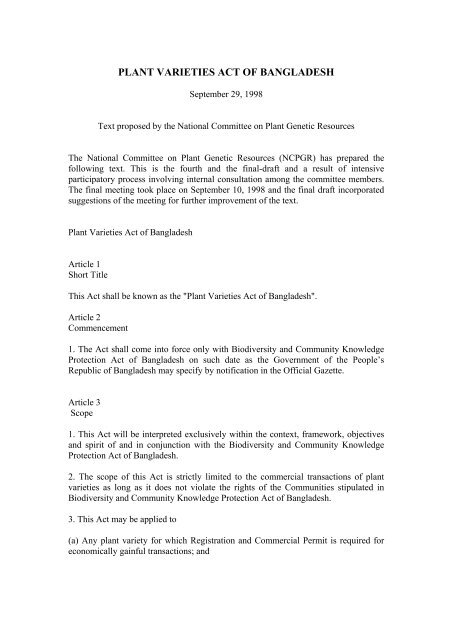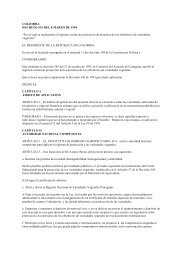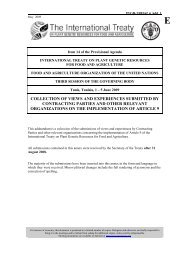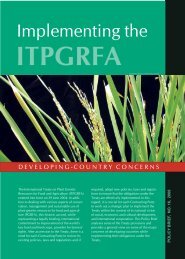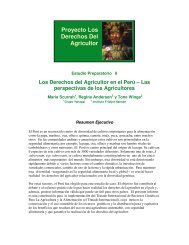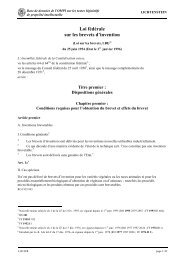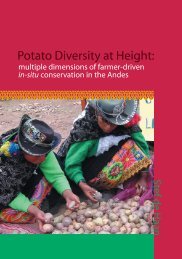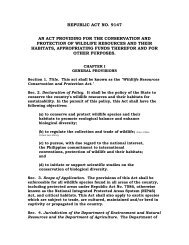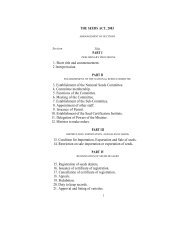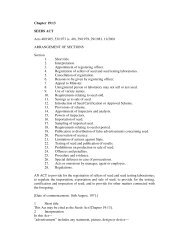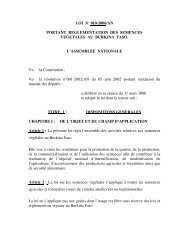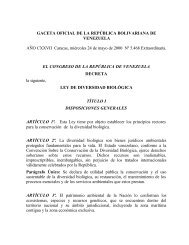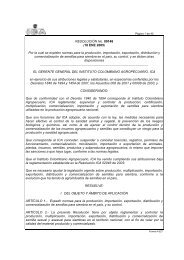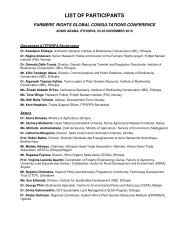PLANT VARIETIES ACT OF BANGLADESH - Farmers' Rights website
PLANT VARIETIES ACT OF BANGLADESH - Farmers' Rights website
PLANT VARIETIES ACT OF BANGLADESH - Farmers' Rights website
Create successful ePaper yourself
Turn your PDF publications into a flip-book with our unique Google optimized e-Paper software.
<strong>PLANT</strong> <strong>VARIETIES</strong> <strong>ACT</strong> <strong>OF</strong> <strong>BANGLADESH</strong><br />
September 29, 1998<br />
Text proposed by the National Committee on Plant Genetic Resources<br />
The National Committee on Plant Genetic Resources (NCPGR) has prepared the<br />
following text. This is the fourth and the final-draft and a result of intensive<br />
participatory process involving internal consultation among the committee members.<br />
The final meeting took place on September 10, 1998 and the final draft incorporated<br />
suggestions of the meeting for further improvement of the text.<br />
Plant Varieties Act of Bangladesh<br />
Article 1<br />
Short Title<br />
This Act shall be known as the "Plant Varieties Act of Bangladesh".<br />
Article 2<br />
Commencement<br />
1. The Act shall come into force only with Biodiversity and Community Knowledge<br />
Protection Act of Bangladesh on such date as the Government of the People’s<br />
Republic of Bangladesh may specify by notification in the Official Gazette.<br />
Article 3<br />
Scope<br />
1. This Act will be interpreted exclusively within the context, framework, objectives<br />
and spirit of and in conjunction with the Biodiversity and Community Knowledge<br />
Protection Act of Bangladesh.<br />
2. The scope of this Act is strictly limited to the commercial transactions of plant<br />
varieties as long as it does not violate the rights of the Communities stipulated in<br />
Biodiversity and Community Knowledge Protection Act of Bangladesh.<br />
3. This Act may be applied to<br />
(a) Any plant variety for which Registration and Commercial Permit is required for<br />
economically gainful transactions; and
(b) Newly innovated plant varieties of which the inventor or owner of the invention,<br />
or the right holder of the protected plant variety stipulated in this Act, wishes to<br />
engage in activities of monetary gains from the commerce of his or her innovation.<br />
4. This Act shall in no way affect Communities as<br />
(a) Owner, user, custodian and steward of plant varieties held in common and<br />
(b) Residual Title holder as stipulated in Biodiversity and Community Knowledge<br />
Protection Act, and<br />
(c) Farming community with <strong>Farmers'</strong> Right as stipulated in this Act.<br />
5. This Act shall in no way affect the rights of farmers to have unencumbered access<br />
to biological and genetic resources of Bangladesh and related knowledge, intellectual<br />
practices and culture.<br />
6. This Act shall in no way affect the rights to collect, conserve, propagate and use the<br />
propagation materials of any variety, irrespective of the privileges granted in<br />
accordance with this Act, as long as it is strictly for personal and non-commercial use<br />
and not exchanged by the user in the commercial market for monetary or other forms<br />
of financial gains.<br />
7. This Act shall not in any way limit the rights of farmers as innovators and the right<br />
to be recognized as such and awarded individually or as a group, or both, for the<br />
innovation. Farmers can apply for such award under the Biodiversity and Community<br />
Knowledge Protection Act of Bangladesh and will be entitled to receive the award<br />
through National Biodiversity Authority. This will not prohibit the farmers to apply<br />
under this act for rights stipulated in the Plant Varieties Act of Bangladesh.<br />
8. The new plant variety shall be considered as ‘innovation’ or ‘invention’ only as<br />
stipulated in the Biodiversity and Community Knowledge Protection Act of<br />
Bangladesh in order to acknowledge individual moments of the social process of<br />
invention or innovation. Accordingly the Act shall ensure that innovations or<br />
inventions such as new plant variety is recognized only through and by the<br />
Community and not as a claim of privileges and/or rights by any subject outside the<br />
social process of knowledge production.<br />
9. Any other Act that is inconsistent with the Plant Variety Act of Bangladesh shall be<br />
deemed discarded or applicable only to the extent that it is consistent with this Act.<br />
Article 4<br />
Definitions<br />
In this Act:<br />
"Plant" means any living organism in the Plant Kingdom including Fungus Kingdom<br />
excluding bacteria and other microorganism.<br />
"Plant Variety" means a group of plants which has identical or similar genetic and<br />
botanical characteristics resulting from a given genotype or combination of genotypes
and having specific, stable properties; it can be distinguished from other plant<br />
varieties of the same plant specie by the expression of at least one of the said<br />
characteristics.<br />
"Community Variety" means a plant variety which is widely distributed within a<br />
particular community within the country, registered in the Community Biodiversity<br />
Registry or declared by National Biodiversity Authority as such including any plant<br />
variety which has not been registered as a new plant variety.<br />
"Local Variety" means a plant variety, which originates within the country, exists<br />
within the country, is registered in the Community Biodiversity Registry, is declared<br />
by the National Biodiversity Authority as such and has been widely utilized.<br />
"Wild Specie" means a plant variety in its native habitat that has not been<br />
domesticated by any community for direct cultivation.<br />
"Transgenic Plant" means a plant which has undergone the transplanting of gene(s)<br />
from other original genetic material which can be animal, plant, or microorganism;<br />
the transplanted gene(s) are either original or have been modified by human<br />
intervention; resulting in a plant which has characteristics not found in nature.<br />
"Genetics Material" means any material or parent organism containing functional<br />
units of heredity from one generation to another generation.<br />
"Propagation Material" means a plant or any other parts of a plant, which can be<br />
propagated by agricultural practices where such propagation is required.<br />
“Protection” for this Act shall always mean defined and specific commercial<br />
privileges, whether explicitly mentioned or not, approved and granted to an innovator<br />
by the National Biodiversity Authority and shall not constitute any generalized<br />
intellectual property rights, and may vary from applicant to applicant on the basis of<br />
the nature of innovation.<br />
"Agricultural Practice" means practice of farmers in order to generate crops for food,<br />
fibers, forestry products, construction materials, fuelwood, fodder, biomass or any<br />
biological products produced by direct or indirect intervention in the immediate<br />
environment.<br />
"Community" shall mean the same as defined in Biodiversity and Community<br />
Knowledge Protection Act of Bangladesh.<br />
"Farmer" means an individual who practices farming, whether subsistence or<br />
commercial, excluding a juristic person.<br />
"Competent Official" means a person appointed for a specific function by the<br />
National Biodiversity Authority.<br />
Consult Article 4 of Biodiversity and Community Knowledge Protection Act for other<br />
definitions.
Article 5<br />
Executing Agency<br />
1. The National Biodiversity Authority shall be the executing agency of this Act.<br />
2. The National Biodiversity Authority shall have the power to make appropriate<br />
Rules, Regulations, and Procedures to implement this Act, including setting up<br />
administrative bodies and/or institutional infrastructure.<br />
3. The National Biodiversity Authority shall constitute an independent and<br />
autonomous body to be known as Bio-safety Commission with the competent citizens<br />
of Bangladesh dedicated to safeguard the interest of the people of the country and<br />
having no source of financial gain from transgenic products or from commercial<br />
organization engaged in production and trade in transgenic products.<br />
Article 6<br />
New Plant Variety<br />
1. The New Plant Variety shall be a plant variety, which must have the following<br />
characteristics:<br />
(a) be a new plant variety, in other words a hitherto nonexistent plant variety.<br />
(b) be a plant variety with consistent specific traits<br />
(c) be a plant variety with stable specific traits<br />
(d) be a plant variety with distinctive specific traits<br />
2. A plant variety may be considered a New Plant Variety even if no propagation<br />
materials thereof have been utilized; whether by sale or distribution through any<br />
means within or outside Bangladesh.<br />
3. A propagation material used for more than 6 months prior to the date of filing<br />
application stipulated in this Act shall not be considered as a New Plant Variety.<br />
4. A plant variety with consistent specific traits is a plant variety, which has consistent<br />
physiological, morphological, anatomical and other properties resulting from genetic<br />
expression specific to that plant variety. Minor variations due to production process<br />
may only be allowed if there is clear explanation.<br />
5. A plant variety with stable specific traits is a plant variety, which can express the<br />
declared specific traits whenever any propagation material of the plant variety is<br />
propagated through normal agricultural/farming practices.<br />
6. A plant variety with distinctive specific traits is a plant, which is distinctively<br />
different from other plant varieties recognized on the date of filing of the application<br />
regarding physiological, morphological, anatomical and any other property resulting<br />
from the genetic expression.<br />
7. A plant variety recognized on the date of filing of the application belongs to<br />
widespread or common plant varieties including the following:
(a) a plant variety registered by the National Biodiversity Authority in the Community<br />
Biodiversity Registry, or registered under the Plant Varieties Act of Bangladesh, or<br />
with National Seed Board whether within or outside of Bangladesh, prior to the date<br />
of filing of the protection application.<br />
(b) a plant variety, for which application for protection under this Act has been made<br />
and which has subsequently been registered.<br />
(c) a plant variety, for which application for protection within Bangladesh has been<br />
made but the applicant has subsequently abandoned the application.<br />
8. Nomenclature of the recognized plant variety as well as the New Plant Variety shall<br />
be in accordance with the criteria, procedures and conditions prescribed by the<br />
National Biodiversity Authority and/or in accordance with the recommendation of the<br />
National Seed Board.<br />
Article 7<br />
General Provisions<br />
1. National Biodiversity Authority shall proclaim A New Plant Variety with precise<br />
citation of award or defined commercial privileges granted and shall duly maintain all<br />
scientific data, documents and supporting materials of the decision such proclamation<br />
shall be recorded in the Bangladesh Gazette.<br />
2. For this Act all plant varieties, existing or claimed as newly innovated, constitute<br />
the regime of ''prior knowledge" of the people of Bangladesh and therefore not<br />
eligible for any claim for private intellectual property rights, protection or commercial<br />
privilege. It is the sole responsibility of the innovator to prove that Communities<br />
recognize an independent human agency over and above the social process of<br />
innovation and that the innovation is novel never existed before.<br />
3. Breeding by itself, or cosmetic breedings shall not be eligible for commercial<br />
privilege. To be eligible for consideration for such privilege the New Plant Variety<br />
must meet definite and useful needs of the people of Bangladesh. The National<br />
Biodiversity Authority shall take necessary measure to reject New Plant Varieties<br />
having no immediate, direct and substantial benefit to the people of Bangladesh. This<br />
shall however not prejudice the right of the innovator to apply for the Citation of<br />
Award. A hybrid variety shall be considered for application provided that the parents<br />
are available within Bangladesh as a community variety in the public domain.<br />
4. The scientific and technical determination of a plant variety as a New Plant Variety<br />
stipulated by this Act, and the recommendations along with all submitted research<br />
materials and documents must remain easily accessible by any citizen of the country<br />
at least for 3 months before the consideration for proclamation by the National<br />
Biodiversity Authority.<br />
5. A New Plant Variety potentially harmful to the environment, ecology, health and<br />
the welfare of the public shall not be protected under this Act.
6. A New Plant Variety, which has negative consequences, on the biodiversity and/or<br />
the existing biological and genetic resources and the related intellectual and cultural<br />
knowledge and practice, including genetic and cultural erosion, will not be protected<br />
under this Act.<br />
7. A new plant variety, which is a transgenic plant, shall not be eligible for protection,<br />
in other words commercial privileges, unless,<br />
(a) environmental impact assessment is done by relevant agencies/departments<br />
determined by National Biodiversity Authority,<br />
(b) bio-safety assessment is done by the Bio-safety Commission to protect<br />
Bangladesh from biological pollution,<br />
(c) The owner of the new transgenic variety agrees in writing, along with the<br />
application for protection, to pay compensation for hazards and damages, if caused by<br />
the use and handling of the transgenic variety. In such cases assessment of such<br />
hazards and damages shall be decided by the Bio-safety Commission,<br />
(d) The applicant agrees that the transgenic nature of the new plant variety will be<br />
declared to the public and will appear clearly on the label and logo and other related<br />
information materials,<br />
(e) It is determined by the National Biodiversity Authority that the applicant is<br />
financially sound to meet liabilities in case of hazards.<br />
8. Any innovator who has innovated a New Plant Variety is eligible to apply for<br />
protection of the new plant variety. The right to apply for protection can be inherited<br />
in accordance with the criteria and procedures stipulated by the National Biodiversity<br />
Authority.<br />
9. The right to apply for protection of a New Plant Variety, resulting from research<br />
conducted by employee under an employment contract or by a hiring or contracting<br />
commissioned research to innovate a new plant variety; shall belong to the employer,<br />
if but only if the employment contract does not specify otherwise.<br />
10. Innovation of all New Plant Varieties in any National Public Research<br />
Institutions, such as educational institutions run by the government, NARCs,<br />
autonomous and semi-autonomous institutions, will be considered automatically as<br />
property belonging to the people of Bangladesh. Any innovation done with the<br />
financial support of the State or with resources from public finance or development<br />
fund will also be considered common property.<br />
11. Innovation of New Plant Variety by any individual, any Non-governmental<br />
Organization or any organization that uses or has used local or foreign development<br />
funds that are in principle funds donated for the public good, will also be considered<br />
as common property and no protection or any commercial privileges can be claimed<br />
for those varieties. This shall not prejudice the right of the innovator to apply for<br />
Citation of Award.<br />
12. In all cases of innovation of New Plant Varieties that are common property as<br />
mentioned above, the National Biodiversity Authority will take necessary action to<br />
prevent all claims of intellectual property right on innovations that rightfully belong<br />
to the people of Bangladesh.
13. The Act shall always distinguish between the right of innovator for social<br />
recognition and adequate financial award to compensate and continue research and<br />
the claim for exclusive commercial privileges to make profit from invention or<br />
innovation. Nothing in this Act shall limit the right of the innovator to get<br />
compensation and adequate financial support from the National Biodiversity<br />
Authority in the form of direct grant or other non-exclusive commercial privileges to<br />
raise research fund that are not directed to earn profit.<br />
Article 8<br />
Scopes of Application for the Innovators<br />
1. Any juridical person (e.g. individual, Community, Corporations, etc) may apply as<br />
innovator either for the New Plant Variety Certificate to protect the innovation, or for<br />
National Biodiversity Award for the innovation of a New Plant Variety All<br />
applications must include necessary documents for the claim.<br />
2. If more than one innovator collaboratively developed a New Plant Variety, they<br />
may jointly make an application.<br />
3. In case any innovator does not wish to apply, cannot be contacted or does not<br />
qualify for the application; the other innovator may apply for the certificate or award<br />
for the New Plant Variety, which was collaboratively developed, in his/her name.<br />
4. The innovator who has collaboratively developed the New Plant Variety and has<br />
not filed the joint application are eligible to file joint application at anytime prior to<br />
the gazetted publication of the registration of the new plant varieties approved<br />
through New Plant Variety Certificate or National Biodiversity Award.<br />
5. Upon receiving the application, the Competent Officials shall notify the date of<br />
examination to the applicant(s) and the other co-applicant, if any.<br />
6. The Competent Officials will determine the dates for applicant and the coapplicant(s)<br />
to testify or ask to submit additional documents before such dates can be<br />
determined.<br />
7. Upon the completion of necessary examination by the Competent officials a notice<br />
shall be sent to the applicants and co-applicant (s) with date/dates.<br />
8. In case of contesting claims the rights with regard to protection or award will be<br />
equally shared.<br />
Article 9<br />
Eligibility<br />
1. The following persons are eligible to apply:<br />
(a) A Bangladeshi national, or a juristic person, whose headquarters are situated in<br />
Bangladesh; and
(b) Other national(s) or juristic person(s) from a country that recognizes the<br />
Biodiversity and Community Knowledge Protection Act of Bangladesh and permits a<br />
Bangladeshi national or a juristic person, whose headquarter is situated in<br />
Bangladesh, to apply for the protection in within that country;<br />
2. The following person(s) are not eligible to apply:<br />
(a) An individual or juristic person who has violated the Biodiversity and Community<br />
Knowledge Protection Act of Bangladesh.<br />
(b) Nationals or juristic person whose headquarter is in a country that is not a<br />
signatory to the Convention on Biological Diversity.<br />
Article 10<br />
Rejection of Applications<br />
Applications shall be rejected on grounds of:<br />
1. Non-disclosure of vital information: If any applicant(s) used the following in the<br />
innovation but did not disclose the information in the application.<br />
(a) Community Varieties, local or indigenous varieties and/or wild species or any part<br />
of the plant varieties or any biological and genetic materials and related intellectual<br />
and cultural knowledge from Bangladesh or from countries that are Party to the<br />
Convention on Biological Diversity;<br />
(b) Advantage from the local and indigenous knowledge of the present or the past of a<br />
Community.<br />
2. Non-indication of origin: If applicants who fail to provide the origin of biological<br />
and genetic resources and related intellectual and cultural practices used in the<br />
innovation.<br />
3. Invalid contract of benefit sharing: If the biological or genetic resources and related<br />
intellectual and cultural knowledge of any Community/ies was used and/or any<br />
Community was involved in the innovation, but<br />
(a) No fair and equal benefit sharing contract has been signed between the innovator<br />
and the Community/ies<br />
(b) Terms of contract are detrimental to the national interest or against the interest of a<br />
Community holding Residual Titles, and<br />
(c) If National Biodiversity Authority does not accept the nature and content of<br />
benefit sharing contract because it is against the spirit and content of this Act as well<br />
as against Biodiversity and Community Knowledge Protection Act of Bangladesh<br />
4. Abuse of intellectual property rights: Application from applicant(s) who has the<br />
history of<br />
(a) claiming intellectual property rights on biological and genetic materials and<br />
related intellectual and cultural knowledge belonging to the people of Bangladesh<br />
and/or to communities of other countries,<br />
(b) claiming protection on plant varieties that was not the applicant/s innovation, and<br />
(c) If National Biodiversity Authority anticipates any potential abuse.
5. Refusal to return resources: Applicant(s) who did not return the biological<br />
resources or genetic materials and related intellectual and cultural knowledge in any<br />
form in his/her possession taken from Bangladesh, before the enactment of this law,<br />
despite request made by National Biodiversity Authority.<br />
6. None of the rejected applications shall be reconsidered.<br />
7. New application from the same applicant(s) may be considered if satisfactory<br />
explanation is provided for the causes of prior rejection.<br />
Article 11<br />
Incomplete Applications<br />
1. The National Biodiversity Authority shall determine the following applications as<br />
incomplete:<br />
(a) The financial terms of the benefit sharing contract of the applicant(s) with<br />
Community/ies from the commercial and technological gains of the New Plant<br />
Variety, applied for protection, is insufficient. The National Biodiversity Authority<br />
may assess the gains from the commercial profit potential of the New Plant Variety.<br />
(b) The benefit sharing contract by the applicant, in terms of technology transfer,<br />
sharing of scientific and technical knowledge, research communication, skill sharing<br />
and in other relevant areas, with the Community/ies is insufficient and inadequate.<br />
(c) The benefit sharing contract between the applicant(s) and Community/ies is not<br />
fair and does not reflect the spirit and objective of the Biodiversity and Community<br />
Knowledge Protection Act of Bangladesh.<br />
(d) the information provided is inadequate, incomplete or mistaken about materials<br />
and intellectual and cultural knowledge, particularly about the origin, that were used<br />
in the innovation, or about the Community/ies involved in the innovation, and<br />
(e) application is incomplete for any other reasons.<br />
2. Incomplete applications shall be reconsidered only if they are corrected and<br />
remedied to the satisfaction of the National Biodiversity Authority.<br />
Article 12<br />
Procedures for Application<br />
1. Applications shall be filed in simple, readable and widely understandable Bangla to<br />
the Competent Official with a fee determined by the National Biodiversity Authority.<br />
2. The application must be submitted in a prescribed form provided by the National<br />
Biodiversity Authority.<br />
3. In addition to the information required by this Act as stipulated in other Articles the<br />
prescribe form must include:<br />
(a) The name and description of the new innovation
(b) Description in clear and simple Bangla language on how the materials and<br />
knowledge were utilized in the innovation, and the process of derivation of the New<br />
Plant Variety or other knowledge and intellectual results.<br />
(c) The language, style and structure of the description should be clear and must be<br />
presented following the step by step technical process, so that any interested citizen of<br />
Bangladesh can learn and apply the knowledge. This is mandatory for technology<br />
transfer and, consequently, for the enhancement of the technical capacity of<br />
Bangladesh.<br />
(d) A statement to certify that the applicant shall submit propagation material and<br />
genetic material of the registering plant to the competent officials for references, upon<br />
request.<br />
(e) An agreement on fee and/or shared revenue of not less than 25 percent in case a<br />
community variety, a local indigenous plant variety, an indigenous plant variety<br />
and/or a wild plant variety has been utilized in the plant innovation process and<br />
(f) Other information as specified by National Biodiversity Authority.<br />
4. The application must include the fair and equitable benefit-sharing contract with<br />
Community/ies, where applicable, and the approval of the contract by the National<br />
Biodiversity Authority.<br />
Article 13<br />
Granting of the Application<br />
1. Before consideration for granting award or protection the Competent Official shall<br />
(a) examine the New Plant Variety in the laboratory and/or in a field plot to ascertain<br />
if the plant variety possesses characteristics and/or properties claimed by the<br />
applicant.<br />
(b) examine if the innovation claimed for award has the characteristics and/or<br />
properties claimed by the applicant.<br />
2. Examination of the innovation and/or of the New Plant Variety shall be in<br />
accordance with the criteria, procedures and conditions as stipulated by the National<br />
Biodiversity Authority in accordance with this Act.<br />
3. The applicant(s) shall bear the costs of all examinations according to the rate,<br />
procedures and conditions prescribed by the National Biodiversity Authority.<br />
4. Competent Officials shall prepare a report on the examination to the National<br />
Biodiversity Authority.<br />
5. National Biodiversity Authority shall consider the report and take action<br />
accordingly.<br />
6. The decision/actions taken by the National Biodiversity Authority shall be<br />
communicated to the applicant.
7. If the applicant is eligible for New Plant Variety Certificate or National<br />
Biodiversity Award, the National Biodiversity Authority shall publish the decision in<br />
widely circulated national media.<br />
Article 14<br />
Other Actions on the Application<br />
1. If New Plant Variety Certificate or National Biodiversity Award cannot be issued<br />
or awarded to the applicant since they do not meet the requirement of this Act, the<br />
National Biodiversity Authority shall<br />
(a) order abandoning of the application,<br />
(b) order a Competent Official to notify the applicant.<br />
(c) order competent officials to notify the applicant of any opposition to the claim.<br />
Article 15<br />
Dispute Settlement<br />
1. Any person may give Notice of Opposition to the decision on New Plant Variety<br />
Certificate, National Biodiversity Award, and Commercial Permit taken on any<br />
application to the Competent Officials within ninety days from the date of publication<br />
of the decision in a national media or at any time during the processing of the<br />
application.<br />
2. The Notice of Opposition should clearly indicate that,<br />
(a) he/she is more eligible for the right to apply for the Plant Protection Registration,<br />
National Biodiversity Award or Commercial Permit; and<br />
(b) that the decision violates certain specific Article or Articles of Biodiversity and<br />
Community Knowledge Protection Act and/or New Plant Variety Protection Act.<br />
3. The Competent Official shall send a copy of the duplicated Notice of Opposition to<br />
the applicant and instruct that the applicant file responsive arguments within ninety<br />
days from the date of receiving the Notice of Opposition.<br />
4. If the applicant fails to provide responsive argument within the stipulated days the<br />
application shall be deemed abandoned. The Notice of Opposition and the arguments<br />
shall be filed with the necessary evidences.<br />
5. If responsive arguments are provided by the applicant, more information and<br />
evidences may further be submitted by both sides, or both can testify in accordance<br />
with the criteria, procedures and conditions stipulated by the National Biodiversity<br />
Authority.<br />
6. On the basis of the testimony and the submitted information, evidences and/or<br />
documents the National Biodiversity Authority shall make a decision and<br />
communicate to the applicant and the opponent.
7. If the National Biodiversity Authority decides that the opponent is entitled to apply<br />
instead of the original applicant, the application will be abandoned without prejudice<br />
to the right of the applicant to go to Court.<br />
8. After the determination that the opponent is entitled to apply the opponent may<br />
proceed to do so in accordance with this Act.<br />
9. If the Notice of Opposition is rejected it shall be deemed as abandoned and the<br />
application shall prevail, without prejudice to the opponent's right to take the matter to<br />
the Court.<br />
10. If the applicant still remains eligible for Plant Protection Registration, National<br />
Biodiversity Award or Commercial Permit the National Biodiversity Authority shall<br />
recommend and approve the application. The approved application for Plant<br />
Protection Registration shall be submitted to the Parliament for proclamation.<br />
11. The recommendation for Plant Protection Registration for the New Plant Variety<br />
and Commercial Permit for propagation materials shall require a payment of a grant<br />
fee to be determined by the National Biodiversity Authority.<br />
12. If the grant fee is not paid within the stipulated days, not more than 90 days, or as<br />
determined by National Biodiversity Authority, the application shall be deemed<br />
abandoned.<br />
Article 16<br />
Period of Plant Protection<br />
1. The highest period of protection or commercial privileges for the new plant variety,<br />
shall be<br />
(a) 7 years for annuals<br />
(b) 10 years for BI-annuals<br />
(c) 15 years for perennials<br />
(d) 25 years for woody plants, utilizing timber<br />
The period shall be calculated from the date of receiving the New Plant Variety<br />
Certificate.<br />
Article 17<br />
Citation of Award for<br />
New Plant Variety<br />
1. Citation of Award shall constitute one of the forms of National Biodiversity awards<br />
for New Plant Variety and shall be administered by the National Biodiversity<br />
Authority to encourage and recognize the contribution of Communities, or individual<br />
human agency identified and recognized by the Community/ies, in accordance with<br />
the Procedures for Application (Article 12) stipulated by this Act.
2. Any innovation in New Plant Variety, whether eligible for New Plant Variety<br />
Certificate or not, shall be deemed eligible for "Citation of Recognition" by the<br />
National Biodiversity Authority. This shall be awarded as a certificate issued by the<br />
National Biodiversity Authority.<br />
3. All innovations eligible for Citation of Award are those innovations that are equally<br />
eligible for New Plant Variety Certificate, but for which the applicant does not claim<br />
any commercial privilege or protection for personal gain. It is therefore deemed as<br />
contribution to the common national wealth of the country.<br />
4. The Citation of Award shall constitute the following:<br />
a. presentation of the Citation of Award as the highest achievement in Science and<br />
Technology in the area of biodiversity and genetic resources and related knowledge,<br />
intellectual practice and culture and shall be signed by the President of the People's<br />
Republic of Bangladesh.<br />
b. a sum of financial award to be decided by the National Biodiversity Authority<br />
keeping in consideration of the cost involved in research and the time required for<br />
innovation. For similar awards the financial amount may be rationalized, and may be<br />
same for all similar awardees. The amount shall be reviewed every five years.<br />
5. The recipient(s) of the Citation of Award, if a citizen of Bangladesh, shall be<br />
eligible to be represented in the National Biodiversity Authority if the recipient has<br />
never claimed any commercial privilege or protection for any of his or her previous<br />
innovation(s).<br />
6. The recipient shall automatically be eligible for research grant from the National<br />
Biodiversity Authority and/or the Ministry of Science and Technology or from any<br />
other source administered by the Government of the People's Republic of Bangladesh,<br />
irrespective of his or her educational background, whether from formal scientific<br />
institutions or from informal Community innovation process. The Citation of Award<br />
shall everywhere in Bangladesh be deemed as the certificate of competence of the<br />
recipient in practical science and technology.<br />
7. A portion of the national fund spent in science and technological innovation and the<br />
capacity building shall be earmarked to provide research awards to the recipients of<br />
Citation of Award.<br />
Article 18<br />
Fees<br />
1. The recipient of New Plant Variety Certificate shall pay the annual fee in<br />
accordance with the criteria, procedures and conditions stipulated by the National<br />
Biodiversity Authority within ninety days of receiving the certificate and every year<br />
thereafter.<br />
2. If the recipient of New Plant Variety Certificate does not pay the annual fee in due<br />
time an additional thirty percent will be charged.
3. If the recipient of the New Plant Variety Certificate does not pay the annual fee and<br />
additional charges within ninety days from the expiration date for annual fee payment<br />
the registration of New Plant Variety Certificate shall be deemed expired and the<br />
variety shall become Common National Wealth.<br />
Article 19<br />
Revocation of Certificate and Permit<br />
1. The New Plant Variety Certificate or the Commercial Permit shall be revoked in<br />
the following cases:<br />
(a) The plant variety does not meet the requirement of the characteristics any more as<br />
stipulated in this Act<br />
(b) The plant variety cannot be protected as stipulated in this Act<br />
(c) The recipient of New Plant Variety Certificate or Commercial Permit does not<br />
submit plant propagation materials or information to the Competent Official within<br />
the time limit stipulated by the Competent official.<br />
2. Any party or any interested party may cite the reasons for revocation or the public<br />
prosecutor may appeal to the Court to take the necessary legal action.<br />
3. The date of revocation shall be the date when National Biodiversity Authority or<br />
the Court takes the decision.<br />
4. In such cases such varieties shall automatically become part of Common National<br />
Wealth.<br />
Article 20<br />
Commercial Transaction of Seed<br />
1. All community variety, local and indigenous variety and wild specie registered by<br />
National Biodiversity Authority and recorded in National Biological Information<br />
System or yet to be registered and recorded but in existence as the common biological<br />
and genetic resource of the people of Bangladesh as well as all the knowledge, culture<br />
and practice of cultivation related to these varieties, are being stipulated by this Act as<br />
protected in perpetuity on behalf of the people of Bangladesh and will be legally<br />
treated as protected at all time and in perpetuity confirming that the people of<br />
Bangladesh are their sole owners, users, custodians and stewards.<br />
2. Accordingly, any application for New Plant Variety Certificate or for protection<br />
claiming intellectual property rights for a plant variety any where in the world that<br />
rightfully belongs to the people of Bangladesh, will be considered under this Act as<br />
theft, piracy, or attempt to obtain illegal possession of property of the people of<br />
Bangladesh. In addition to the penalties stipulated by this Act, such offence is also<br />
liable to be tried under criminal law and proceedings of the country.<br />
3. Any plant variety that has not been claimed as an innovation and therefore has not<br />
been registered and protected under this Act, but is available in Bangladesh for more
than one year will be considered as belonging to the common property of the people<br />
of Bangladesh as stipulated above. In such cases the National Biodiversity Authority<br />
will produce such list of plant varieties and publish in public media.<br />
4. In all disputes arising from the claims of intellectual property rights on New Plant<br />
Variety the National Biodiversity Authority or any of its authorized representative<br />
will act as the juridical person on behalf of the people of Bangladesh and will have<br />
the authority to undertake legal actions.<br />
5. The Community shall have all rights, including the right to utilize community<br />
varieties, local varieties and wild species or any part of the plant varieties freely,<br />
without any hindrance and limitation by virtue of this Act, as well as the Biodiversity<br />
and Community Knowledge Protection Act of Bangladesh and other Acts, Laws or<br />
Policies.<br />
6. However if any individual, group or a community decides to engage in commercial<br />
transaction of plant varieties or materials to propagate plants, it will be permitted by<br />
this Act only after receiving a Commercial Permit.<br />
7. Any economic transaction, in a fairly large amount, between farmers where the<br />
purpose is to regain mainly the cost of procurement and distribution of plant varieties<br />
or the propagation materials of plants, if traditional and customary, will require no<br />
Commercial Permit. In that case the individual, group or community engaged in such<br />
transaction shall notify the National Biodiversity Authority, stating the following:<br />
(a) That such transactions contribute to food security, are essential for agricultural<br />
production and has a positive effect on the overall biodiversity of the locality as well<br />
as of the country.<br />
(b) That such transactions do not operate outside the general circulation of seed,<br />
propagating materials or plants within and among the farmers, and is not therefore a<br />
commercial operation for profit.<br />
A competent official may review such transactions to determine the status of the<br />
claim. The limit of such transaction shall be periodically determined by National<br />
Biodiversity Authority that will not require such notification.<br />
8. Any individual utilizing a local indigenous plant variety, a common indigenous<br />
plant variety and a wild plant variety or any part of the plant variety for the<br />
improvement or development for commercial purposes must do the following:<br />
(a) procure Commercial Permit from Competent Officials<br />
(b) pay the fee and follow all procedures to secure the Commercial Permit as<br />
stipulated by the National Biodiversity Authority<br />
(c) Must immediately pay 1 percent of the anticipated total sale and agree to pay part<br />
of the revenue, equal to no less than 15 percent of the total income gained from<br />
utilizing the plant variety in accordance with the criteria, procedures and conditions<br />
stipulated by the National Biodiversity Authority.
(d) obtain a clearance from the National Biodiversity Authority assuring that such<br />
commercial transactions will not have any negative effect on the biodiversity and the<br />
indigenous or local knowledge and culture related to it.<br />
(e) secure an agreement with the local community, from whom the plant variety has<br />
been collected, developed and improved, that the benefit of the commercial gain will<br />
be equitably shared.<br />
National Biodiversity Authority will ensure that the benefit shared with the<br />
community from whom the materials have been collected is fair and equitable.<br />
9. The National Biodiversity Authority shall ensure that such varieties entering into<br />
commercial transaction are not claimed for protection as a New Plant variety allowed<br />
by this Act, or patented in other countries, or claimed by the commercial user as a<br />
variety developed by him or her anywhere in the world. In order to defend the<br />
common property of the people of Bangladesh the National Biodiversity Authority<br />
shall take all necessary actions and will seek support from the National Biodiversity<br />
Authority, whenever needed.<br />
10. If the National Biodiversity Authority determines that any commercial user of<br />
community varieties, local varieties and wild species or any part of the plant varieties<br />
is projecting, offering hints, or in any other manner trying to establish himself or<br />
herself as the originator of such varieties, the permit will be cancelled immediately.<br />
11. The Commercial Permit will not be given to the following applicants:<br />
(a) If National Biodiversity Authority determines that the person applying for<br />
commercial use of community varieties, local or indigenous varieties and wild species<br />
or any part of the plant varieties thereof may claim innovation of that variety, since he<br />
or she has a history of such claims in other countries,<br />
(b) and/or that such or persons did not return the biological resources or genetic<br />
materials in his or her possession taken from Bangladesh before the enactment of this<br />
law or have violated the Biodiversity and Community Knowledge Protection Act of<br />
Bangladesh<br />
12. If the agreement to share revenue with the community from where the materials<br />
have been originally collected is not honored by the person engaged in commercial<br />
activity, the permit to engage in commerce will be cancelled.<br />
13. The revenue shared by the stipulation in this Act shall belong to the community<br />
that conserves, develops or utilizes the community varieties, local varieties and wild<br />
plant varieties.<br />
14. In case more than one communities conserve, develop or utilize the plant variety<br />
the community which utilizes the plant variety shall receive fifty percent share of the<br />
total shared revenue, the remaining shared revenue being deposited in the Plant<br />
Protection Fund.
15. In case any individual in the community is the one who conserves, develops and<br />
accesses the plant variety; the person shall receive thirty percent of the revenue that<br />
the community receives.<br />
16. The plant variety that is eligible for commercial transaction shall have at least the<br />
following characteristics as described in Article 6 of this Act:<br />
(a) be a plant variety that possesses distinctive traits<br />
(b) be a plant variety that possesses consistent traits<br />
17. A member of a Community which is the originator of the plant variety, or of the<br />
Community which conserves, develops or utilizes the local indigenous plant variety,<br />
will get priority in receiving the commercial permit to undertake market transaction of<br />
that plant variety for commercial gains.<br />
18. Registration for Commercial Permit of community varieties by the community<br />
that destroys or is involved in the destruction of the population or the genetic source<br />
of the plant variety shall be prohibited.<br />
19. The application for the Commercial Permit shall be filed with the Competent<br />
Officials according to the general criteria and procedures stipulated by the National<br />
Biodiversity Authority.<br />
20. The application for the Commercial Permit shall contain:<br />
(a) The fruiting season of the plant variety<br />
(b) the general utility of the variety<br />
(c) specific marketing features of the variety that are available from the free exchange<br />
of plants to determine the benefits to the enhancement of biodiversity.<br />
(d) potential dangers of monoculture<br />
(e) Other information as specified by the National Biodiversity Authority<br />
National Biodiversity Authority shall decide the criteria and procedure for any<br />
specific or particular variety whenever need arises.<br />
21. If applied for Commercial permit the Competent Official(s) shall examine the<br />
following:<br />
(a) examine the application according to the claims of the applicant<br />
(b) prepare description of the plant variety from the plant cultivated in the community.<br />
(c) examine the traits of the plant variety eligible for Commercial Permit as stipulated<br />
in this Act and/or the criteria, procedures and conditions as laid by the National<br />
Biodiversity Authority in accordance with this Act.<br />
22. After the completion of the examination the Competent Officials shall report the<br />
examination to the relevant authorities.<br />
23. Decisions of acceptance or rejection of the application for the Commercial Permit<br />
shall be taken by the National Biodiversity Authority on the basis of the report and
shall be communicated to the Applicant within 7 days of the decision. The decision<br />
shall be published in the national media.<br />
24. The Commercial Permit shall remain valid for 5 years. In the absence of new<br />
application from the original recipient or his/her assigned agent the rights shall be<br />
abandoned and the variety shall become part of the Common National Wealth.<br />
Article 21<br />
<strong>Rights</strong> of Recipients<br />
1. Only the recipient of the New Plant Variety Certificate and/or assigned<br />
representative(s) or agent(s) shall be entitled to commercially produce, sell or<br />
distribute, offer, import into Bangladesh or have in possession the New Plant Variety<br />
for which the specific certificate has been issued, with the purpose of cultivating the<br />
propagation materials of the protected plant.<br />
2. Only the recipient of the Commercial Permit and/or his or her assigned<br />
representative(s) or agent(s) shall be entitled to commercially produce, sell or<br />
distribute, offer, import into Bangladesh or have in possession the propagation<br />
material with the purpose of cultivating the specified variety of the plant.<br />
3. Only the recipients of the New Plant Variety Certificate and Commercial Permit<br />
and/or his or her assigned representative(s) or agent(s) shall be entitled to export the<br />
propagation materials with explicit permission from the National Biodiversity<br />
Authority. The National Biodiversity Authority shall issue such permission ensuring<br />
and taking necessary measures that the exported materials will not be claimed for<br />
intellectual property by any party except its rightful owners and/or shall not be used<br />
unlawfully for any purpose.<br />
4. The above provision shall not apply in following cases within Bangladesh:<br />
(a) Any act to study, discover, experiment or research to improve, develop or innovate<br />
a new plant variety or any act for other scientific pursuit.<br />
(b) Any cultivation or propagation of the protected plant variety by the farmer in<br />
his/her own plots, using the propagation material which he/she produces.<br />
(c) Any act for personal benefit with no commercial purposes.<br />
(d) Any act that has been conducted in honest faith.<br />
5. The recipient of the New Plant Variety Certificate and Commercial Permit shall<br />
display the assigned number in the logo of the propagation materials and/or on the<br />
packaging materials as prescribed by National Biodiversity Authority.<br />
6. In case there are more than one recipient of the New Plant Variety Certificate the<br />
assignment or granting of exclusive rights to another party can be done only with<br />
consent from the other recipients.
7. The assigning of agents shall also mean transfer or granting of right to others and it<br />
must be made in writing and registered to the Competent Officials according to the<br />
criteria, procedures and conditions stipulated by the National Biodiversity Authority.<br />
8. <strong>Rights</strong> of the recipient of the New Plant Variety Certificate and Commercial Permit<br />
may be inherited but only according to the criteria, procedures and conditions<br />
stipulated by the National Biodiversity Authority.<br />
9. The National Biodiversity Authority shall always retain the power and authority to<br />
prohibit and/or withhold rights with regard to any plant variety that has been granted<br />
the New Plant Variety Certificate or Commercial Permit in the following cases:<br />
(a) for the security of food and nutrition and to promote local production of food;<br />
(b) for the alleviation of poverty, prevention of disease and the protection of health;<br />
(c) the protection and conservation of the environment and biological diversity;<br />
(d) to stop and reverse the process of genetic erosion and spread of monoculture;<br />
(e) for the prevention of trade monopoly;<br />
(f) to protect the rights of Communities, particularly the rights of Residual Tittle<br />
holders<br />
(g) in response to any crisis in public order (ordre publica)<br />
(h) for specific public benefits, welfare of the population or reasons determined by<br />
National Biodiversity Authority.<br />
10. New Plant Variety Certificate or Commercial Permit shall be revoked and the<br />
rights granted under this certificate abandoned by the National Biodiversity Authority<br />
if the plant variety, for which the above were issued<br />
(a) is not commercially available three years after the issuing date in the case of New<br />
Plant Variety, unless the recipient can prove otherwise.<br />
(b) is not commercially available within a year after the issuing date in the case of<br />
Commercial Permit unless the recipient can prove otherwise.<br />
2. National Biodiversity Authority shall retain the authority and power to abandon the<br />
protection of a New Plant Variety if the protected variety is sold at unreasonably high<br />
price, or in quantities insufficient to the need of Bangladesh, particularly for the<br />
farmer engaged in food production, unless the recipient proves otherwise or takes up<br />
remedial measure.<br />
3. All plant varieties abandoned by the National Biodiversity Authority of privileges<br />
provided through New Plant Variety Certificate and/or Commercial Permit shall<br />
automatically become part of Common National Wealth as stipulated by the<br />
Biodiversity and Community Knowledge Protection Act.<br />
Article 22<br />
<strong>Farmers'</strong> Right and the Plant Protection Fund<br />
1. The farmers comprising a Community shall be entitled to the following <strong>Farmers'</strong><br />
Right in addition to the rights stipulated in Biodiversity and Community Knowledge
Protection Act, and over and above benefit sharing. For the purpose of this Act any<br />
Community engaged in food production, whether living in forest, flood plain, or any<br />
agro-ecological zone, or a member of such Community, women and/or men, will be<br />
considered as Farmer.<br />
(a) The Competent Official(s) shall always effectively inform the farmers in advance<br />
on the access of biological and genetic resources or any part of the local indigenous<br />
plant variety, common indigenous plant variety and wild plant variety.<br />
(b) The Competent Official(s) shall always provide the name and address of the<br />
recipients of New Plant Variety Certificate, Commercial Permit or Citation of Award<br />
mentioning the innovation and/or the name of plant variety for which they were<br />
issued including a brief description of innovation, where applicable.<br />
(c) Any farmer shall have unhindered access to the governmental information<br />
concerning the application and application procedures, the findings of the<br />
examination of the claims and the basis upon which the decision has been taken.<br />
(d) Farmers shall participate in the constitution of National Biodiversity Authority by<br />
nominating representatives. At least 1/3 (one third) of the people constituting the<br />
National Biodiversity Authority must be farmers' representatives of whom at least half<br />
must be practicing farmers of biodiversity based production system.<br />
Farmers shall have the right to:<br />
(e) participate as the plaintiff or file the case as a criminal case or a civil case or other<br />
cases for the injured Community or the community whose right is argued, or of which<br />
the farmer is a member.<br />
(f) receive just compensation for illegal damage caused by the ruling order or for any<br />
act of a person which causes destruction or reduction of biological genetic resources<br />
or plant variety or environmental conditions in the Community.<br />
(g) receive the support from the government in conservation, development and<br />
improvement of local, indigenous or wild plant variety and/or reintroduction of<br />
traditional varieties.<br />
(h) receive support from the government for the maintenance of community gene<br />
banks and research related to conservation in normal household conditions.<br />
(i) submit a petition in court to order the prohibition of monocultures or of any act<br />
that leads to destruction or reduction of local indigenous plant variety or wild plant<br />
variety narrowing the genetic base of Bangladesh Agriculture.<br />
(j) appoint an advisor or a representative to exercise the rights pursuant to this Act.<br />
(k) receive exemption or reduction of import and export tax for equipment and raw<br />
materials for use in experimenting or implementing non-commercial plant<br />
improvement.
(l) proceed for Court orders withstanding the banning of any pesticides, herbicides or<br />
any chemicals, or any genetically modified seed or propagation materials detrimental<br />
to ecology, environment, health and safe food production of the Community. The<br />
Court shall accept such proceeding as the fundamental right of the Community to<br />
protect themselves from any harm.<br />
(m) ask for an equal share of the national budget in science and technology to be<br />
equally spent for the development and improvement of local and indigenous varieties<br />
and the development of biodiversity based production system.<br />
(n) participate in research with the National Agricultural Research System<br />
(o) proceed for a Court order to stop any research or activities that are harmful and<br />
detrimental to the Community.<br />
2. The National Biodiversity Authority shall constitute a ''Plant Variety Development<br />
Fund” comprising the following money and assets:<br />
(a) Money or assets received from the fee of the applicants<br />
(b) Fine collected by virtue of this Act.<br />
(c) Occasional subsidy from the government.<br />
(d) National donations including money raised by the farmers.<br />
(e) Money from interests and benefits earned from this Fund.<br />
(f) Other money received for the implementation of this Fund.<br />
Money and assets pursuant to the paragraph above shall be deposited in the Fund and<br />
do not have to be sent to the Revenue Office. Criteria and procedures in administering<br />
the Fund and allocation of the Fund shall be determined by the National Biodiversity<br />
Authority.<br />
3. The Fund shall be conducted by a Committee where more than half of the members<br />
shall be from the farming Communities. The Committee shall utilize the Fund for the<br />
following activities:<br />
(a) to support and subsidize any activities of the community concerning conservation<br />
and development of plant variety.<br />
(b) to be utilized by local administrative government to support research to conserve<br />
and develop plant variety.<br />
(c) for the Citation of Awards<br />
(c) for administering the Fund.<br />
Article 23<br />
Duties, Obligations and Accountability<br />
1. All implementing authorities or agencies created by National Biodiversity<br />
Authority shall remain accountable to the Management Committee of the National<br />
Biodiversity Authority.
2. For duties, obligations and accountability the Article 19 of Biodiversity and<br />
Community Knowledge Protection Act of Bangladesh shall be the reference for this<br />
Act.<br />
3. Nothing in this Act shall prejudice the right of any citizen to demand redress in the<br />
court of law any where in Bangladesh.


